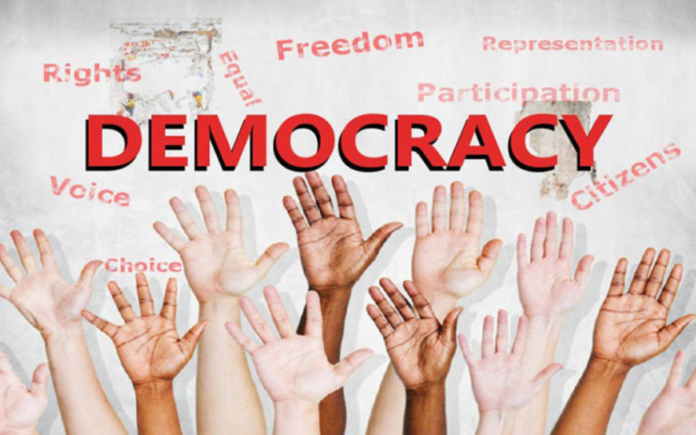What kind of democratic framework is evolving in India where parties, going beyond their boundaries, are beginning to make populist promises, cannot be said to be in the public interest in any way.

Dr. Neeraj Krishna
In elections, there is a frenzy among political parties to offer everything for free to lure voters, leading many states in the country to the brink of disaster. Opportunistic leaders operate on the belief that if the public votes for free promises, they will attain power. Later, it remains to be seen how these promises will be fulfilled, and if they do not gain power, they face no consequences. The government formed will be continually surrounded by accusations that they have done nothing but loot, except for making extravagant promises. These opportunistic leaders are oblivious to the state’s revenue, whether it can bear the burden of their free promises or not. Due to this lack of foresight, these power-hungry leaders become responsible for making the state impoverished, and the constitution still lacks provisions for the punishment of such political malpractices.
These leaders have no principles, no patriotism; their ultimate goal is to attain power by deceiving and enticing the public, making them appear foolish. Parties and leaders of this kind change their ideologies according to the situations in different states; they are purely opportunistic. By distributing alms and making promises of free facilities, all political parties engage in efforts to deceive and entice voters in different states. Encouraging freeloaders for the sake of influencing the central government is not only a means of economic imbalance but also a suicidal endeavor for the governments. The central government should caution those states that, despite losing the capacity to repay debts, are still promoting free schemes. Neglecting the serious economic crisis is an indicator of political insensitivity and an opportunity for opportunistic and self-serving politics to flourish.
What kind of democratic framework is evolving in India where parties, going beyond their boundaries, are beginning to make populist promises, cannot be said to be in the public interest in any way. Regardless of the boundless populist announcements, parties can indeed provide immediate benefits to unattainable assurances beyond their financial resources, but there is also a concern that it may have adverse effects on the country’s long-term social and economic conditions. The question is how political parties and politicians can become so aggressive under the influence of power addiction. This situation is worrisome.
In recent times, there is a growing trend in India to distribute freebies in every political party. Such extravagant and exaggerated announcements and assurances in a democracy not only tarnish the political system but are not only harmful but also indicative of a significant discrepancy. Political parties are entrusted with the responsibility not only to exploit the hard-earned money of the public but to use it for the welfare of the people. Only by responsibly fulfilling this duty can any ruling party or its leaders remain worthy of power.
The question arises whether public resources should be made available for free to anyone. Do governments have the right to spend public funds as they wish, especially when the economic conditions are not comfortable? This trend, inspired by political gains, not only covers up institutional failures but cannot be limited to any one party or government.
Almost all political parties, through extensive campaigns, spend millions of rupees to highlight how they have glorified the state with their proclaimed plans. They deplete the government treasury in the name of providing free water and electricity while the country is not hidden from dire situations. Such grandiosity and the culture of freebies are considered an insult by educated but unemployed individuals. Many times, governments do not have the resources to protect their people from shortages, hunger, and unemployment. However, when they lack funds to address these fundamental issues, how can they distribute facilities for free? Why do they spend hundreds of billions on their propaganda?
Taking into account the economy and the financial condition of the state, almost all parties and governments have distributed items ranging from jewelry, laptops, TVs, smartphones to rice, milk, and ghee. This generosity is a farce. Free medicines, free check-ups, almost free ration, free education, free marriage, free land deeds, money for building free houses, money for having children, money for not having children (family planning), free meals in schools, almost free electricity at 200 rupees a month, free pilgrimage. Everything from birth to death is free. The enthusiasm for distributing everything for free raises the question of why anyone would work. How will the country develop with a culture of freebies? How will the economic balance of governments be maintained? In the past ten years and in the next twenty years, a generation is being prepared or our leaders are creating a generation that will be completely dependent on freebies. If you ask them to work, they will respond with abuse, saying, “What is the government doing?”
What kind of democratic framework is emerging in India where parties, beyond their limits, are starting to make seductive promises, which cannot be said to be in the public interest in any way? Regardless of the countless attractive announcements, parties that go beyond their economic resources and assure things that cannot be fulfilled immediately may indeed benefit in the short term, but there is also concern about the adverse effects on the country’s long-term social and economic conditions. The question is, how can political parties and politicians, intoxicated by the power, become so aggressive? This situation is worrisome.
The boundaries of irony and contradiction are being crossed. No political party provides freebies and charity from its own funds. The money of the taxpayers is being used. We are creating “citizens, not parasites.” How long will the taxpayer of the country support the freeloaders in the minority, while the majority society suffers? When this economic imbalance fails, these freeloaders will be twenty or thirty years old. Those who have never earned their bread in life will always eat for free. Failing to find opportunities, this generation will turn into extremists and radicals but will be unable to work. What kind of society are we building? What kind of contradictory politics is this? It is essential to think seriously, leaving aside politics.
The current era is marked by the spark of lust for power. Politics is underway to make the public and the system handicapped for the pleasure of power. Social reforms, employment, the creation of new enterprises, revitalization of agriculture, and the primary responsibilities of rural life have been neglected from the account books of political parties. All political parties have come together in the hope of bleaching their hands without applying henna and turning them yellow. Instead of saving the public from the addiction to freeloaders, all political parties are busy catching the political owl in their hands. Is this an example of political leaders in a democracy, making people lazy, greedy, dishonest, and creating chaos? Has self-interest and self-indulgence become universal? The conditions are such that echoes of situations like Sri Lanka are being heard in various states.
It is said that it is better to teach someone to catch fish instead of giving them fish, so that they can catch fish themselves and fill their stomachs in the future. Similarly, political parties should help the public in creating jobs and earning long-term income instead of distributing free goods. The problem here lies in the framework of our economic policies. We are mainly behind the GDP, the measure of income. Whether the public gets employment or not, our focus is only on how prosperous the country is; it doesn’t matter if the citizens are poor. As a result, there is no effort to provide employment to the public. Big companies succeed in increasing the GDP, while small industries fail because they produce expensive goods in comparison. Therefore, the government has adopted a policy to eliminate small industries and promote big industries, so that the GDP of the country increases. However, the result is that the common man is helpless. He has neither employment nor any means of income.
Democracy assumes that the public is wise. If that is the case, then the public should be given the opportunity to purchase goods according to their discretion by providing them with cash, rather than receiving the goods that the government wishes to distribute.
In order to win elections, political parties drain the government treasury with both hands. They know that the source of income is limited, yet the trend of distributing subsidies and freebies persists without restraint. There is no consideration given to where the money will come from. This reckless race to distribute freebies is leading the economy towards a downward spiral, burdening the tax-paying class with the weight of crores. This free politics seems to be leading us towards economic decline.
In reality, the common people forget that while they may immediately benefit from such schemes, the burden ultimately falls on their shoulders. Turning a blind eye doesn’t eliminate the danger. The great economist Chanakya also said that humans attach importance to things for which they have to pay a price. Subsidies without necessity make people lazy and indifferent to work. In India, the ongoing political scenario indicates that we are heading towards economic decline.
Efforts to lure voters should have limits. The Indian public must understand that prosperity comes not from freebies but from self-reliance. Elections are a regular occurrence in our country. Before considering free offers as routine, we need to think seriously about their negative consequences. Ultimately, everything depends on the people. Even if there is a loss, the compensation will come from the common citizens.
In Indian politics, all political parties are engaged in efforts to deceive and lure voters by announcing charity and free facilities. Promoting freebies with the intention of influencing political gains and impacting the vote bank is not only an economic imbalance for governments but also a self-destructive measure. The central government should caution those states that, despite losing the ability to repay debts, are still promoting free schemes. Ignoring the serious economic crisis created by this is a sign of political incompetence, and it is a means for opportunistic and self-serving politics to thrive.
Unemployment, the crumbling breath of trade and business, and the problems of farmers are being alleviated by governments through populist measures instead of honestly addressing them. There is now a need to seriously consider such policies. Ensuring the safety of the women of their state is a crucial responsibility for every government, but achieving their complete security involves not just providing free travel in the metro or bus, but also purchasing tickets with other security measures to afford the economic viability of traveling. In reality, by providing free services, we will create a society that is not productive but dependent and inert, and its direct impact will be felt on the country’s economy and progress. The question arises: how long will we support this unethical politics? The first responsibility to curb this lies with the people themselves.


